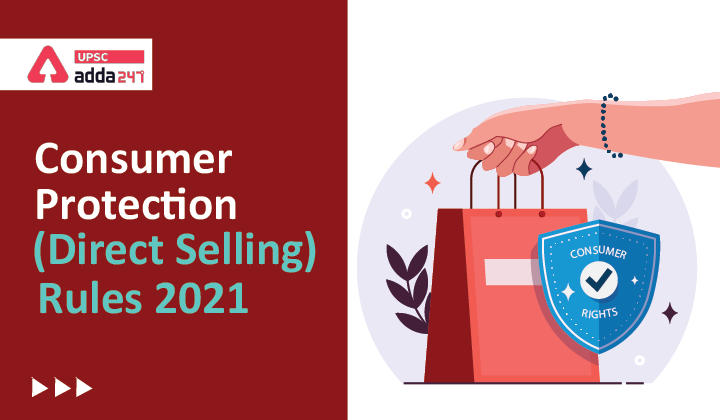Table of Contents
Direct selling rules: Relevance
- GS 2: Government policies and interventions for development in various sectors and issues arising out of their design and implementation.
Direct selling rules: Context
- Recently, Ministry of Consumer Affairs, Food & Public Distribution has notified the Consumer Protection (Direct Selling) Rules, 2021 under Consumer Protection Act, 2019.
What is direct selling?
- Direct selling is a business model in a non-retail segment like at home, online or other venues, where people sell products or services directly to end customers.
Direct selling companies in India
- Amway, Oriflame and Tupperware are the most prominent players in the direct selling segment.
- Vestige, Avon, Modicare, RCM, Herbalife, Keva Kaipo Industries Pvt. Ltd, Mi Lifestyle Marketing Global Private Limited have also gained grounds in the recent years.
Direct selling rules: Key points
- These Rules shall apply to:
- All goods and services bought or sold through direct selling,
- All models of direct selling,
- All direct selling entities offering goods and services to consumers in India,
- All forms of unfair trade practices across all models of direct selling and also to also to a direct selling entity which is not established in India, but offers goods or services to consumers in India.
- Existing direct selling entities need to comply of these rules within ninety days from the date of publication of these rules in the Official Gazette.
Direct selling entity and direct sellers are prohibited from:
- Promoting a Pyramid Scheme or enrol any person to such scheme or participate in such arrangement in any manner whatsoever in the garb of doing direct selling business;
- Participate in money circulation scheme in the garb of doing direct selling business.
What is a pyramid scheme?
- A pyramid scheme is a fraudulent system of making money based on recruiting an ever-increasing number of “investors.”
- The initial promoters recruit investors, who in turn recruit more investors, and so on.
- The scheme is called a “pyramid” because at each level, the number of investors increases.
- The small group of initial promotors at the top require a large base of later investors to support the scheme by providing profits to the earlier investors.
Rules for direct selling
- Grievance Redressal Officer: Every direct selling entity to establish an adequate grievance redressal mechanism.
- Grievance redressal officer to acknowledge the receipt of any consumer complaint within forty-eight working hours of receipt of such complaint and redresses the complaint normally within a period of one month.
- Nodal Officer: Every direct selling entity shall appoint a nodal officer who shall be responsible for ensuring compliance with the provisions of the Act.
- Filing complaints: Every direct selling entity shall establish a mechanism for filing of complaints by consumers through its offices or branches or direct sellers.
- Advertisements: Every direct selling entity shall ensure that the advertisements for marketing of goods or services are consistent with the actual characteristics, access and usage conditions of such goods or services.
- Fake reviews: No direct selling entity shall, directly or indirectly, falsely represent itself as a consumer and post reviews about its goods or services or misrepresent the quality or features of any of its goods or services.
- Liability of the product: A direct selling entity which explicitly or implicitly vouches for the authenticity of the goods or services sold, or guarantees that such goods or services are authentic, shall bear the liability in any action related to the authenticity of such goods or services.
- Monitoring: Notwithstanding the distribution system adopted by it, a direct selling entity shall monitor the practices adopted by its direct sellers and ensure compliance with these rules by means of legally binding contract with such direct sellers.
- Seller identification: Every direct selling entity shall maintain a record of relevant information allowing for the identification of all direct sellers who have been delisted by the direct selling entity and such list shall be publicly shared on its website.
Also Read:




 TSPSC Group 1 Question Paper 2024, Downl...
TSPSC Group 1 Question Paper 2024, Downl...
 TSPSC Group 1 Answer key 2024 Out, Downl...
TSPSC Group 1 Answer key 2024 Out, Downl...
 Cabinet Ministers of India 2024, New Cab...
Cabinet Ministers of India 2024, New Cab...







